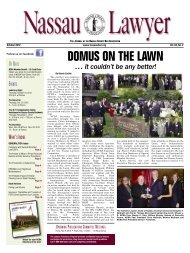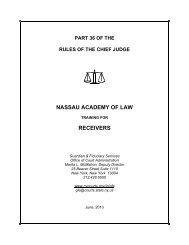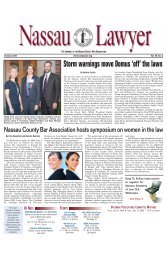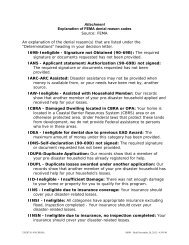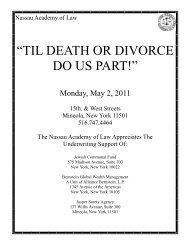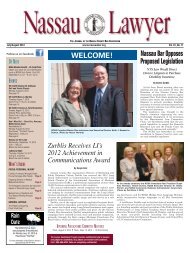302 B.R. 760 Page 16302 B.R. 760(Cite as: 302 B.R. 760)Compl. 70, 76, 81. Accepting these allegations astrue, Sharp must still adequately plead the absence <strong>of</strong>fair consideration to state a claim for constructivefraudulent conveyance under the D.C.L. See AtlantaShipping Corp., Inc. v. Chemical Bank, 818 F.2d 240,248 (2d Cir.1987) ("An essential element <strong>of</strong> a claimpursuant to DCL §§ [273-275] is lack <strong>of</strong> fair consideration.").[18] The statute defines "fair consideration" in thefollowing manner:Fair consideration is given for property ...a. When, in exchange for such property ... as a fairequivalent therefor, and in good faith, property isconveyed or an antecedent debt is satisfied, orb. When such property ... is received in good faithto secure a present advance or antecedent debt inamount not disproportionately small as comparedwith the value <strong>of</strong> the property ... obtained.*779 See D.C.L. § 272. Thus, there are three elementsto "fair consideration" under the D.C.L.: first,the recipient <strong>of</strong> the debtor's property must either conveyproperty or discharge an antecedent debt in exchange;second, the exchange must be for a fairequivalent; and third, the exchange must be "in goodfaith." See HBE Leasing Corp. v. Frank, 61 F.3d1054, 1058-59 (2d Cir.1995).Sharp acknowledges that the $12 million payment toState Street satisfied an antecedent debt, and that theexchange was for fair equivalent value. Thegravamen <strong>of</strong> Sharp's constructive fraudulent conveyanceclaim is that State Street did not receive thepayment in good faith because at the time <strong>of</strong> thepayment, it was aware <strong>of</strong> the Spitzes' fraud (and thusknew or had reason to know <strong>of</strong> Sharp's insolvency),and because the payment was intended as a quid proquo for Sharp's assistance in the fraud on the Noteholders."The precise meaning <strong>of</strong> 'good faith' in the context <strong>of</strong>the law <strong>of</strong> fraudulent conveyances has been the bone<strong>of</strong> jurisprudential contention among the states thathave adopted the UFCA." See Ostashko v. Ostashko,2002 WL 32068357, at *22 (E.D.N.Y. Dec. 12,2002); see also Boston Trading Group, Inc. v. Burnazos,835 F.2d 1504 (1st Cir.1987) (Breyer, J.) (recognizingthat "courts and commentators have had difficultydetermining the meaning <strong>of</strong> 'good faith' in [the]definition <strong>of</strong> 'fair consideration.' "). For one thing,state and federal courts in New York have differed asto whose good faith matters, with some suggestingthat both parties' good faith must be established, andothers contending that the good faith requirementapplies to the transferee alone. Compare, e.g., JulienJ. Studley, Inc. v. Lefrak, 66 A.D.2d 208, 412N.Y.S.2d 901 (2d Dep't 1979) ("[T]he good faith <strong>of</strong>both transferor and transferee is stressed as an indispensiblecondition in the definition <strong>of</strong> fair consideration."),aff'd, 48 N.Y.2d 954, 425 N.Y.S.2d 65, 401N.E.2d 187 (1979); with HBE Leasing Corp., 61 F.3dat 1058 ("The 'good faith' in § 272 is the good faith <strong>of</strong>the transferee[.]").More fundamentally, courts have struggled to determinethe role <strong>of</strong> a subjective "good faith" requirementin the context <strong>of</strong> constructive fraudulent conveyancelaw, which is designed to "reduc[e] the role <strong>of</strong> thedebtor's subjective intent and expand[ ] the role <strong>of</strong>objective factors." Note, supra at 497; Nisselson v.Drew Indus., Inc. (In re White Metal Rolling &Stamping Corp.), 222 B.R. 417, 428-29(Bankr.S.D.N.Y.1998) ("Although tagged with thetitle 'fraudulent,' fraud has nothing to do with theconstructive fraudulent conveyance claim. The transactionis based on the transferor's financial conditionand the sufficiency <strong>of</strong> the consideration provided bythe transferee."); see also United States v. McCombs,30 F.3d 310, 326 n. 1 (2d Cir.1994) ("We are notentirely clear from the case law, however, just howthe 'good faith' requirement under section 272 operatesin the context <strong>of</strong> a fraudulent conveyance claimunder section 273, a constructive fraud statute wherethe issue <strong>of</strong> intent is irrelevant."). Indeed, D.C.L. §§273, 273a and 275 expressly indicate that the intent<strong>of</strong> the transferor is irrelevant. On the other hand,some inquiry into the "mental states <strong>of</strong> the parties tothe transaction" would appear to be necessary "inorder to preserve the distinction between 'good faith'and 'fair equivalent,' " Ostashko, 2002 WL 32068357,at *22, which both the text <strong>of</strong> the D.C.L. and the caselaw clearly indicate are two distinct requirements.See D.C.L. § 272 (defining fair consideration as entailingthe conveyance <strong>of</strong> property or satisfaction <strong>of</strong>an antecedent debt "as a fair equivalent ... and ingood faith.") (emphasis added); In re Manshul ConstructionCorp., 2000 WL 1228866, at *52(S.D.N.Y.2000) ("Even if a transaction involves anexchange <strong>of</strong> fair *780 equivalents, a transaction alsolacks fair consideration if it was not made in goodfaith."); Ede v. Ede, 193 A.D.2d 940, 598 N.Y.S.2d90, 92 (3d Dep't 1993) ("[F]air consideration requiresthat the exchange not only be for equivalent value,© 2009 Thomson Reuters. No Claim to Orig. US Gov. Works.
302 B.R. 760 Page 17302 B.R. 760(Cite as: 302 B.R. 760)but also that the conveyance be made in goodfaith[.]") (citations omitted); see also Note, supra at505 (noting that an assessment <strong>of</strong> good faith that focusessolely on the values exchanged "effectivelyeliminates the good-faith requirement and thus disregardsthe statutory language specifying two distinctelements <strong>of</strong> 'fair consideration.' "). [FN13]FN13. Given the confused state <strong>of</strong> the caselaw, these questions concerning the content<strong>of</strong> the good faith requirement would be appropriatefor certification to the New YorkCourt <strong>of</strong> Appeals. Unfortunately, "[n]eitherthe New York Court <strong>of</strong> Appeals rule implementingthe relevant state constitutionalprovision nor the federal provisions providingfor certification to New York's highestcourt allows for a decision to certify by thedistrict courts in the Second Circuit."Hamilton v. Accu-Tek, 62 F.Supp.2d 802,847 (E.D.N.Y.1999) (citing 22 NYCRR §500.17, Second Circuit Local Rule 0.27).State Street argues categorically, that the repayment<strong>of</strong> a valid antecedent debt--at least where a fairequivalent is exchanged--cannot be a constructivefraudulent conveyance, unless the transfer is made toan insider, such as an <strong>of</strong>ficer, director, or majorstockholder <strong>of</strong> the transferor. See Atlanta Shipping,818 F.2d at 249 ("In general, repayment <strong>of</strong> an antecedentdebt constitutes fair consideration unless thetransferee is an <strong>of</strong>ficer, director, or major shareholder<strong>of</strong> the transferor."). In response, Sharp devotes much<strong>of</strong> its argument to the proposition that "good faith" isan independent element <strong>of</strong> "fair consideration." However,this does not do much to illuminate the precisecontent <strong>of</strong> the requirement.[19][20] Taken by themselves, Sharp's allegationsconcerning State Street's knowledge <strong>of</strong> the Spitzes'scheme and the bank's resulting awareness thatSharp's reported financial condition did not reflect thecompany's actual financial condition--i.e., that thecompany was insolvent--are not enough to support alack <strong>of</strong> "good faith" under the D.C.L.'s definition <strong>of</strong>fair consideration. Some courts have suggested that"good faith may be lacking because <strong>of</strong> a transferee'sknowledge <strong>of</strong> a transferor's unfavorable financialcondition at the time <strong>of</strong> the transfer." In re CheckmateStereo & Electronics, Ltd., 9 B.R. 585, 617(Bankr.E.D.N.Y.1981), aff'd, 21 B.R. 402(E.D.N.Y.1982); accord Ostashko, 2002 WL32068357, at *23; In re Centennial Textiles, Inc., 220B.R. 165, (Bankr.S.D.N.Y.1998). However, a findingthat good faith is lacking based solely on the transferee'sawareness that the transferor (for one reasonor another) lacks the resources to satisfy all his debtswould run afoul <strong>of</strong> the fundamental principle that apreference--a payment by an insolvent debtor satisfyingdebts to one creditor at the expense <strong>of</strong> others--isnot a fraudulent conveyance. See G. Glenn, FraudulentConveyances and Preferences § 289 (1940) ("Ifthere is one point more ungrudgingly accepted thanothers, it is that a preferential transfer does not constitutea fraudulent conveyance.").In a sense, all preferences prejudice the unfavoredcreditors, inasmuch as the debtor's remaining assetsare by definition insufficient to fully cover the debtsowed to them. However, the correction <strong>of</strong> this unfairnessis not the aim <strong>of</strong> fraudulent conveyance law. SeeBoston Trading, 835 F.2d at 1510 ("The basic object<strong>of</strong> fraudulent conveyance law is to see that the debtoruses his limited assets to satisfy some <strong>of</strong> his creditors;it does not normally try to choose among them."). AsJustice *781 Sullivan <strong>of</strong> the First Department <strong>of</strong> theAppellate Division has explained:[A] conveyance which satisfies an antecedent debtmade while the debtor is insolvent is neitherfraudulent nor otherwise improper, even if its effectis to prefer one creditor over another.... It is <strong>of</strong>no significance that the transferee has knowledge<strong>of</strong> such insolvency. Nor is the transfer subject to attackby reason <strong>of</strong> knowledge on the part <strong>of</strong> thetransferee that the transferor is preferring him toother creditors, even by virtue <strong>of</strong> a secret agreementto that effect.Ultramar Energy Limited v. Chase Manhattan Bank,N.A., 191 A.D.2d 86, 90-91 599 N.Y.S.2d 816, 819(1st Dep't 1993) (internal citations and quotationmarks omitted).Concededly, what is alleged here is different than thetypical preference, since State Street is alleged tohave known not just <strong>of</strong> Sharp's insolvency but alsothat the particular funds used to repay it were acquiredby dishonest means. However, absent anyallegations <strong>of</strong> State Street's participation in the fraudon the Noteholders, this knowledge alone is not sufficientto establish a lack <strong>of</strong> good faith, and thus theabsence <strong>of</strong> fair consideration, under the D.C.L. §272. This issue was extensively analyzed in Boston© 2009 Thomson Reuters. No Claim to Orig. US Gov. Works.
- Page 1 and 2:
Nassau Academy of LawCLE Live Class
- Page 3 and 4:
McKinney's Debtor and Creditor Law
- Page 5 and 6:
McKinney's Debtor and Creditor Law
- Page 7 and 8:
McKinney's Debtor and Creditor Law
- Page 9 and 10:
McKinney's Debtor and Creditor Law
- Page 11 and 12:
McKinney's Debtor and Creditor Law
- Page 13 and 14:
McKinney's Debtor and Creditor Law
- Page 15 and 16: McKinney's Debtor and Creditor Law
- Page 17 and 18: McKinney's Debtor and Creditor Law
- Page 19 and 20: BAKER & HOSTETLER LLP45 Rockefeller
- Page 21 and 22: usiness of defendant Bernard L. Mad
- Page 23 and 24: BACKGROUND, THE TRUSTEE, AND STANDI
- Page 25 and 26: Madoff who received fraudulent tran
- Page 27 and 28: ased on fictitious profits and for
- Page 29 and 30: 28. BLMIS funds were also used to p
- Page 31 and 32: Madoff, and her niece, Shana Madoff
- Page 33 and 34: 42. Ruth Madoff was never an employ
- Page 35 and 36: FIRST CAUSE OF ACTIONTURNOVER AND A
- Page 37 and 38: 66. At the time of each of the Two-
- Page 39 and 40: Transfers; (b) directing that the S
- Page 41 and 42: EIGHTH CAUSE OF ACTIONUNDISCOVERED
- Page 43 and 44: TENTH CAUSE OF ACTIONDISALLOWANCE O
- Page 45 and 46: 111. Mrs. Madoff benefited from the
- Page 47 and 48: WHEREFORE, the Trustee respectfully
- Page 49 and 50: 2(c)(3): (a) preserving the Subsequ
- Page 51 and 52: 302 B.R. 760 Page 1302 B.R. 760(Cit
- Page 53 and 54: 302 B.R. 760 Page 3302 B.R. 760(Cit
- Page 55 and 56: 302 B.R. 760 Page 5302 B.R. 760(Cit
- Page 57 and 58: 302 B.R. 760 Page 7302 B.R. 760(Cit
- Page 59 and 60: 302 B.R. 760 Page 9302 B.R. 760(Cit
- Page 61 and 62: 302 B.R. 760 Page 11302 B.R. 760(Ci
- Page 63 and 64: 302 B.R. 760 Page 13302 B.R. 760(Ci
- Page 65: 302 B.R. 760 Page 15302 B.R. 760(Ci
- Page 69 and 70: 302 B.R. 760 Page 19302 B.R. 760(Ci
- Page 71 and 72: 394 B.R. 721 Page 1394 B.R. 721, 50
- Page 73 and 74: 394 B.R. 721 Page 3394 B.R. 721, 50
- Page 75 and 76: 394 B.R. 721 Page 5394 B.R. 721, 50
- Page 77 and 78: 394 B.R. 721 Page 7394 B.R. 721, 50
- Page 79 and 80: 394 B.R. 721 Page 9394 B.R. 721, 50
- Page 81 and 82: 394 B.R. 721 Page 11394 B.R. 721, 5
- Page 83 and 84: 394 B.R. 721 Page 13394 B.R. 721, 5
- Page 85 and 86: 394 B.R. 721 Page 15394 B.R. 721, 5
- Page 87 and 88: 394 B.R. 721 Page 17394 B.R. 721, 5
- Page 89 and 90: 394 B.R. 721 Page 19394 B.R. 721, 5
- Page 91 and 92: 394 B.R. 721 Page 21394 B.R. 721, 5
- Page 93 and 94: 397 B.R. 642 Page 2397 B.R. 642(Cit
- Page 95 and 96: 397 B.R. 642 Page 4397 B.R. 642(Cit
- Page 97 and 98: 397 B.R. 642 Page 6397 B.R. 642(Cit
- Page 99 and 100: 397 B.R. 642 Page 8397 B.R. 642(Cit
- Page 101 and 102: 397 B.R. 642 Page 10397 B.R. 642(Ci
- Page 103 and 104: 397 B.R. 642 Page 12397 B.R. 642(Ci
- Page 105 and 106: 397 B.R. 642 Page 14397 B.R. 642(Ci
- Page 107 and 108: 443 F.3d 180 Page 2443 F.3d 180(Cit
- Page 109 and 110: 443 F.3d 180 Page 4443 F.3d 180(Cit
- Page 111 and 112: 443 F.3d 180 Page 6443 F.3d 180(Cit
- Page 113 and 114: 443 F.3d 180 Page 8443 F.3d 180(Cit
- Page 115 and 116: 443 F.3d 180 Page 10443 F.3d 180(Ci
- Page 117 and 118:
443 F.3d 180 Page 12443 F.3d 180(Ci
- Page 119 and 120:
Page 2257 A.D.2d 526, 684 N.Y.S.2d
- Page 121 and 122:
Page 4257 A.D.2d 526, 684 N.Y.S.2d
- Page 123 and 124:
Page 6257 A.D.2d 526, 684 N.Y.S.2d
- Page 125 and 126:
770 N.Y.S.2d 421 Page 22 A.D.3d 780
- Page 127 and 128:
Page 14 A.D.3d 495, 773 N.Y.S.2d 71
- Page 129:
Page 34 A.D.3d 495, 773 N.Y.S.2d 71
- Page 132 and 133:
780 N.Y.S.2d 409 Page 29 A.D.3d 553
- Page 134 and 135:
Page 134 A.D.3d 231, 824 N.Y.S.2d 3
- Page 136 and 137:
Page 334 A.D.3d 231, 824 N.Y.S.2d 3
- Page 138 and 139:
Page 2991 F.2d 31(Cite as: 991 F.2d
- Page 140 and 141:
Page 4991 F.2d 31(Cite as: 991 F.2d
- Page 142 and 143:
Page 6991 F.2d 31(Cite as: 991 F.2d
- Page 144 and 145:
FRAUDULENT TRANFERENCESRonald M. Te
- Page 146 and 147:
Nursing home case_ Transfer of pers
- Page 148 and 149:
Sections 548 and 544 work in concer
- Page 150 and 151:
U.S. Supreme CourtBFP v. Resolution
- Page 152 and 153:
example, from net 15 to COD; or cha
- Page 154 and 155:
Bankruptcy Code Section§ 548. Frau
- Page 156:
Ron Terenzi is a founding partner a



